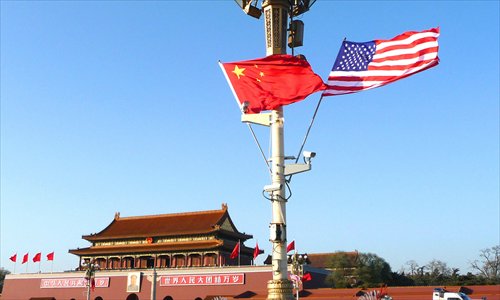'Silent Contest' silenced

Chinese and US national flags flutter on a lamppost at Tiananmen Square to welcome the visit of US President Barack Obama in Beijing on 17 November, 2009. Photo: IC
Recently, a 92-minute documentary, Silent Contest, allegedly produced by the Chinese PLA National Defense University (NDU), has caused wide speculation online. The film is an exploration of the belief that the US remains China's enemy and has never stopped its strategies to westernize and divide China.
The film warns Chinese nationals, especially political and military officials, to keep on high alert against alleged US ideological infiltration and political subversion.
The video was first circulated among military fans and netizens in late October.
On October 31, at a regular press conference, when asked to verify the video, Ministry of National Defense's spokesperson Yang Yujun said "we will not comment." Efforts to reach the NDU information office failed.
But since that day, the film has become unavailable on domestic websites.
But the documentary can still be watched on foreign websites and it's free to search the topic and comment the film on domestic websites. On Sina Weibo, there are 98,000 entries on the film so far. The video posted on youtube.com on October 26 has gained 69,000 visits and 391 comments.
Some suspected that the film was carelessly leaked to the Internet from Chinese internal military circle, some speculated the removal of the film is intended to avoid a harmful impact to the Sino-US ties, and some said it shows the authorities' fear of igniting confrontations between the "left" and "right."
In a Chinese context, the "right" supports reform and westernization while the "left" is nationalist and more pro-government.
Stamp of approval
According to the subtitles of the film's end, the film was produced by the NDU's political commissar Liu Yazhou and president Wang Xibin, and made by the university's information management center in June 2013.
Nationalist views are not rare among Chinese military academics. China's military academies are in a peculiar position, largely isolated from both the experience of real soldiering and also from the global academic community.
Military academics often attempt to raise their personal profile with nationalistic comments targeted at a young, angry, and largely male audience. But commentators such as the Diplomat's J. Michael Cole, point to the film as part of "the ongoing dialogue and jockeying for influence" in a wider political context.
The film, voiced by Ren Zhihong, a popular anchor of CCTV's National Treasure Archive program noted for his clear voice, contained historical footage, statement or quotes by politicians and scholars from home and abroad, and interviews with several senior Chinese military officials.
Starting with flashing text stating of "The process of China to realize rejuvenation is inevitably accompanied by running-in and struggles with the US' hegemonic system, and it is a century-contest independent of man's will," the film's first half offers its own analysis of the reasons behind the decline of the Communist Party of the Soviet Union.
"A regime that is in self-denial instead of self-improvement, refuses to make progress, does not trust people's power but trusts the myth of the West, and loses its ruling foundation, decline and fall step by step are inevitable," the film said.
It claims that since the dissolution of the Soviet Union, China has become the major target for the US to carry out "political genetic modifications."
"They [the American elites] confidently believe that only by approaching, contacting and accepting China, and incorporating it into the US-led system of international political economy, can they better fragment and undermine China. This is the best option with minimum strategic cost and price," Liu Yazhou says in the film.
Nevertheless, citing survey results from Chinese Academy of Social Sciences and the NDU, the film said the majority of the "masses and cadres" do not have a precise knowledge of the US "political plots" regarding China.
Qu Xing, head of the China Institute of International Studies, says in the film that this "would easily put us to fall leeward and ill-prepared in crucial times."
Qu admitted to accepting the interview but refused to give details or comment on this story.
An interview request to the Ministry of National Defense, asking for information about the film's removal, was also rejected. A staff member at the ministry's publicity office told the Global Times that they had already given a response at the latest press conference.

A US fleet replenishment oiler refuels two Japanese destroyers at a joint naval drill at the Pacific Ocean in December 2010. Photo: CFP
Internal reactions
The video has triggered mixed reactions.
"The film shows that the high-level officials are thinking clearly about US plots. Besides, it also warns the leadership not to treat the US' attempts at non-violent revolution lightly," Zhang Diancheng, a military commentator who has watched the video, told the Global Times.
He also said the film is quite necessary and timely, and will help increase the netizens' proper awareness of the Sino-US relations.
"Today, various schools of thought have risen on the Internet. Demons and monsters [those who advocate Western democracy and criticize the ruling Party] dance like mad," he noted.
Xue Litai, a member of the Center for International Security and Cooperation at Stanford University, curiously speculated in the Singapore-based Lianhe Zaobao that the film might have been orchestrated by American conservatives, intending to force Washington to take tougher policies against Beijing.
Or, he said it might be a confidential film within the Chinese military, used to urge themselves to upgrade their combat capabilities. But it was leaked by somebody who wanted to provoke a crisis in Sino-US relations, Xue added.
The film's second half mainly claims that the US tries to infiltrate and induce China to realize political transition under the banner of democracy, freedom and human rights, including allegedly bribing and nurturing pro-US politicians and intellectuals, corrupting Chinese youth with Western culture, preaching, and funding anti-China forces. Electronic music and luxury goods are also accused of being tools of the West.
Some foreign non-governmental organizations flocked to China to hunt for young promising officials and draw them over to its side, the film said, citing that the Ford Foundation, the China International Republican Institute, the Carter Center and the Asia Foundation have long been engaged in assisting Chinese grass-roots elections and local management reform.
The film also claims that social-networking sites have become another effective tool for Washington to exert its influence. "The Tunisian revolution, the Jasmine Revolution and the turmoil in North Africa and Middle East are the test and preview for the US to start a larger scale media war in the future," said the film.
After watching the video, a military forum kdnet.net user even offered methods to help uncover "those Western agents that have already infiltrated in Chinese political arena," asking high-level officials to reveal their property holdings and the nationality of their immediate family.
Some said the film made unsupported claims about US "infiltration" of China but neglected the general background of cooperation between two sides, and will incite anti-US sentiment.
He Weifang, professor at Peking University Law School, said the film is "extremely ridiculous." His name and "traitorous" statements were highlighted in the film along with Mao Yushi's, a well-known economist and free market advocate.
"The film is filled with a Cold War mentality and provocative words. It demonizes all the words and deeds by some nations' people in pursuing freedom and democracy. The corruption resulted from lack of democracy and rule of law is even claimed to be an American conspiracy. It's extremely ridiculous," He stated on his Weibo on October 27.
Instability quelled
Xue commented that widespread broadcasting of the film online would encourage the leftists, stir up the arguments between them and the rightists and add risks to the social instability.
"The struggles between leftists and rightists in Chinese society have intensified. But the middle class is still not strong enough to have a powerful voice and cannot work well as a mediator in neutralization. As a result, the two sides argue and are as incompatible like water and fire," Xue said.
The film has made a wave among many Weibo celebrities, including Ran Xiang, a vocal advocate against the call for multi-party democracy and the introduction of Western values in China, Cai Xiaoxin, a military history researcher, Dai Xu, an air force colonel and military strategist, and Sima Nan, a Maoist scholar.
"This is a very important signal. You are soft, he tough, you weak, he strong. In such a battle to vie for ideological discourse power, [we] must dare to show sword, as the brave prevails in struggles," Sima said in a microblog post.
Ran Xiang called on her Weibo to "tighten publicity" and "fully support those people who are attacked for upholding the truth" when "facing increasingly aggressive forces of anti-China, penetration and subversion."
Zhang Lei, the moderator of a military forum, said the film is a good teaching material for soldiers and politicians but not appropriate for ordinary people.
"The masses with lots of complaints about officials' corruption would hardly recognize the film's ideas. In addition, it would become a target for rightists to attack," Zhang told the Global Times.
Several foreign media interpreted the film as a signal released by Chinese hard-line officials who wanted to warn the Party leaders to keep a proper distance from the US and not to take drastic reforms ahead of the key Third Plenum.
Ralph Benko, a former junior official in the Reagan White House, said the accusations of the film are appalling.
"I would be appalled if fracturing China were American policy and do not believe it to be the case. America and the world absolutely need a healthy, vibrant, unified and benevolent China," Benko told the Global Times in an e-mail.
He believes that political subversion ceased to be an accepted instrument of policy in the US decades ago. "The American political elites now are overwhelmingly hostile to such measures," he said.
"Our core cultures and values are so compatible - both Chinese and Americans fundamentally, despite our imperfections, are so dignified and admirable of character - that there are an abundance of reasons for optimism about a long, harmonious relationship," he added.
Wang Peng, a PhD candidate in politics and international studies at the University of Bristol, said at a commentary on the Financial Times Chinese edition that the film is more likely targeted at domestic Party officials instead of inciting anti-US sentiment, considering a series of rectification campaigns the Chinese new leadership has launched within the Party.
"We must see clearly that the risks and challenges come not only from outside, but more from inside. The victory in the contest lies not only on keeping vigilant on enemies, but more on reinforcing ourselves," the film concludes.